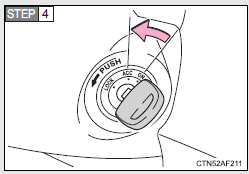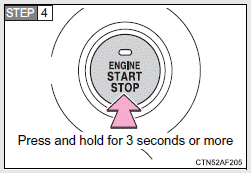 Toyota RAV4: If your vehicle has to be stopped in an emergency
Toyota RAV4: If your vehicle has to be stopped in an emergency
Only in an emergency, such as if it becomes impossible to stop the vehicle in the normal way, stop the vehicle using the following procedure:
1 Steadily step on the brake pedal with both feet and firmly
depress it.
Do not pump the brake pedal repeatedly as this will increase the
effort required to slow the vehicle.
2 Shift the shift lever to N.
If the shift lever is shifted to N
3 After slowing down, stop the vehicle in a safe place by the road.
4 Stop the engine.
If the shift lever cannot be shifted to N
3 Keep depressing the brake pedal with both feet to reduce vehicle speed as much as possible.

Vehicles without a smart key system: Stop the engine by turning the engine switch to the “ACC” position.

Vehicles with a smart key system:
Stop the engine by pressing and holding the “ENGINE START STOP” switch for 3 consecutive seconds or more.
5 Stop the vehicle in a safe place by the road.
CAUTION
■If the engine has to be turned off while driving
●Power assist for the brakes and steering wheel will be lost, making the
brake pedal harder to depress and the steering wheel heavier to turn.
Decelerate as much as possible before turning off the engine.
●Vehicles without a smart key system: Never attempt to remove the key, as
doing so will lock the steering wheel.
 If the vehicle becomes stuck
If the vehicle becomes stuck
Carry out the following procedures if the tires spin or the vehicle
becomes stuck in mud, dirt, or snow.
1 Stop the engine. Set the parking brake and put the shift
lever in P.
2 Remove the mud, sn ...
 Vehicle specifications
Vehicle specifications
Detailed vehicle information. ...
See also:
Operating tips (for automatic air conditioner)
When the engine coolant temperature and
outside air temperature are low, the air flow
from the foot outlets may not operate for a
maximum of 150 seconds. However, this is not a
malfunction. Af ...
Dealer locations
Details of Land Rover Dealers are held on the
Navigation System hard drive as a points of
interest (POI) category. Certain Dealers may be
located in areas that are not fully mapped on
the hard dri ...
Most common causes of corrosion
The most common causes of corrosion
are:
1. The accumulation of moisture retaining
dirt and debris in body panel sections,
cavities, and other areas.
2. Damage to paint and other protective
...
